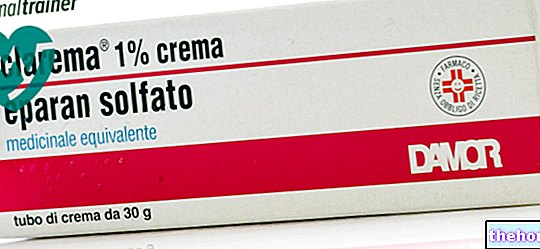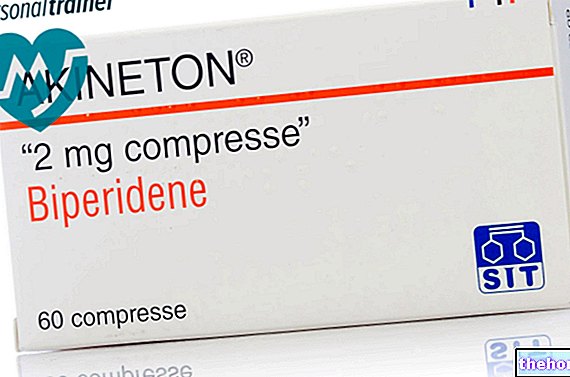Active ingredients: Pyridoxine (vitamin B6)
Benadon 300 mg gastro-resistant tablets
Why is Benadon used? What is it for?
Benadon contains pyridoxine hydrochloride (vitamin B6)
Benadon belongs to the category of vitamin-based drugs.
Benadon is indicated in the following cases:
- therapy and prevention of vitamin B6 deficiencies (malnutrition, alcoholism, etc.);
- therapy of anemia sensitive to vitamin B6; treatment and prevention of inflammation of the nerves (neuritis) in the case of therapy with isoniazid (drug for tuberculosis), hydralazine (antihypertensive drug for arterial hypertension), penicillamine (drug for rheumatoid arthritis) , cycloserine (an antibiotic);
- adjuvant therapy during radiotherapy.
Talk to your doctor if you don't feel better or if you feel worse.
Contraindications When Benadon should not be used
Do not take Benadon
- if you are allergic to pyridoxine hydrochloride (vitamin B6) or any of the other ingredients of this medicine;
- if you are pregnant or breastfeeding;
- if you are under the age of 12;
- if you suffer from kidney or liver failure (reduced kidney or liver function).
Precautions for use What you need to know before you take Benadon
Talk to your doctor or pharmacist before taking Benadon.
Do not take Benadon at higher than recommended doses, or for longer periods. At daily doses of 300 mg (1 tablet) or higher, vitamin B6 should not be taken for more than 5 months. After 5 months of treatment, a suspension of at least 25 days is required.
Severe neurotoxicity may occur if you do not follow these recommendations (danger of overdose, see "If you take more Benadon than you should").
Take special care if you suffer from Parkinson's and are being treated simultaneously with L-DOPA, as vitamin B6 in high doses can antagonize its effects (see "Other medicines and Benadon").
Children and adolescents
This medicine should not be taken by children and adolescents under 12 years of age.
Interactions Which drugs or foods can modify the effect of Benadon
Tell your doctor or pharmacist if you are taking, have recently taken or might take any other medicines.
Several medicines interfere with vitamin B6 and can decrease its levels in the blood. Among these:
- Cycloserine (an antibiotic),
- Hydralazine (an antihypertensive),
- Isoniazid (an antituberculosis),
- Deoxypyridoxine (vitamin B6 antagonist),
- D-penicillamine (medicine used for metabolic diseases),
- Oral contraceptives.
Vitamin B6 may reduce the effectiveness of the medicines listed below when administered concomitantly:
- L-Dopa (medicine against Parkinson's disease): this interaction does not occur when Carbidopa is used together with Levodopa,
- Altretamine (an anticancer),
- Phenobarbital (an antiepileptic),
- Phenytoin (an antiepileptic).
The concomitant administration of amiodarone (a medicine used in certain types of arrhythmias, ie changes in the heartbeat) and vitamin B6 could intensify the photosensitivity (allergic skin reaction to the sun, such as sunburn) induced by amiodarone.
Interactions with laboratory tests
Urobilinogen: Pyridoxine (vitamin B6) can cause a false positive in the urobilinogen test with Ehrlich's reagent. If you have to have this test, tell your doctor or laboratory staff that you are taking Benadon.
Warnings It is important to know that:
Benadon with alcohol
Alcohol interferes with vitamin B6 and can lower its levels in the blood.
Pregnancy, breastfeeding and fertility
If you are pregnant or breast-feeding, think you may be pregnant or are planning to have a baby, ask your doctor or pharmacist for advice before taking this medicine.
Due to the high dosage of vitamin B6 which far exceeds the recommended dietary dosage, Benadon is contraindicated in pregnancy and lactation.
If you are a woman of childbearing age, use effective methods of contraception during treatment.
Dosage and method of use How to use Benadon: Dosage
Always take this medicine exactly as described in this leaflet or as directed by your doctor or pharmacist. If in doubt, consult your doctor or pharmacist.
The recommended dose is: 300 mg per day (1 tablet), orally, following your doctor's instructions.
Swallow the tablet with a sufficient amount of water, without chewing it.
In convulsions and anemia sensitive to vitamin B6, higher doses may be needed (600 mg per day or more, i.e. 2 tablets or more).
At daily doses of 300 mg (1 tablet) or higher, vitamin B6 should not be taken for more than 5 months. After 5 months of treatment, a suspension of at least 25 days is required
Use in children and adolescents
This medicine should not be taken by children and adolescents under 12 years of age.
Use in patients with renal or hepatic insufficiency (reduced kidney or liver function)
Due to the high dosage of vitamin B6, which far exceeds the recommended dietary dosage, do not take Benadon if you have kidney and liver failure (see "Do not take Benadon").
Overdose What to do if you have taken too much Benadon
If you accidentally take an overdose of Benadon, notify your doctor immediately or go to the nearest hospital.
Symptoms of vitamin B6 overdose may include: sensory and / or peripheral neuropathy (nerve pain) and neuronopathy (nerve cell degeneration), nausea, headache, paraesthesia (altered sensation in the limbs or other parts of the body, e.g. tingling), sleepiness, increased AST (SGOT) (liver enzyme) and decreased blood folic acid concentrations.
These effects usually disappear when the medicine is stopped.
If you have any further questions on the use of this medicine, ask your doctor or pharmacist.
Side Effects What are the side effects of Benadon
Like all medicines, this medicine can cause side effects, although not everybody gets them.
In association with the use of Benadon, the following undesirable effects, resulting from spontaneous reports, have been observed. As these reactions are reported on a voluntary basis, it is not possible to estimate their frequency.
Effects on the gastrointestinal system
- nausea,
- He retched.
Effects on the immune system
- allergic reactions (in predisposed subjects).
Effects on the nervous system
- peripheral neuropathy (disease affecting peripheral nerves) and polyneuronopathy (disease affecting several peripheral nerves simultaneously),
- paraesthesia (changes in sensation in the limbs or other parts of the body, for example tingling
Effects on the skin
- photosensitivity reactions (allergic skin reactions to sunlight, such as sunburn),
- rash,
- itch,
- hives (itching and small spots on the skin),
- bullous dermatitis.
Reporting of side effects
If you get any side effects, talk to your doctor or pharmacist. This includes any possible side effects not listed in this leaflet. You can also report side effects directly via the Website: https: //www.aifa.gov.it/content/segnalazioni-reazioni-avverse
By reporting side effects you can help provide more information on the safety of this medicine.
Expiry and Retention
Keep this medicine out of the sight and reach of children.
Do not use this medicine after the expiry date which is stated on the carton and blister. The expiry date refers to the last day of that month. The expiry date refers to the product in intact packaging, correctly stored.
Do not throw any medicines via wastewater or household waste. Ask your pharmacist how to throw away medicines you no longer use. This will help protect the environment.
What Benadon contains
- The active ingredient is pyridoxine hydrochloride (vitamin B6). One gastro-resistant tablet contains 300 mg of pyridoxine hydrochloride.
- The other components are: povidone K90, talc, magnesium stearate, methacrylic acid - ethyl acrylate copolymer (1: 1), carmellose sodium, macrogol 6000.
What Benadon looks like and contents of the pack
Benadon 300 mg gastro-resistant tablets: 10 tablets.
Source Package Leaflet: AIFA (Italian Medicines Agency). Content published in January 2016. The information present may not be up-to-date.
To have access to the most up-to-date version, it is advisable to access the AIFA (Italian Medicines Agency) website. Disclaimer and useful information.
01.0 NAME OF THE MEDICINAL PRODUCT
BENADON 300 MG GASTRORESISTANT TABLETS
02.0 QUALITATIVE AND QUANTITATIVE COMPOSITION
One gastro-resistant tablet contains: pyridoxine hydrochloride (vitamin B6) 300 mg.
For the full list of excipients, see section 6.1.
03.0 PHARMACEUTICAL FORM
Benadon is available as gastro-resistant tablets for oral use.
04.0 CLINICAL INFORMATION
04.1 Therapeutic indications
Therapy and prophylaxis of vitamin B6 deficiencies (malnutrition, alcoholism, etc.).
Treatment and prophylaxis of neuritis in case of therapy with isoniazid, hydralazine, penicillamine, cycloserine.
Pyridoxine-sensitive anemias. Adjuvant therapy during radiotherapy.
04.2 Posology and method of administration
Benadon is indicated for adults and adolescents from 12 years of age.
Dosage
One tablet a day orally, following the doctor's instructions.
In pyridoxine-sensitive seizures and anemias, higher doses (600 mg per day or more) may be needed in some patients.
Due to the high dosage of vitamin B6, which largely exceeds the recommended dietary dosage, the product is not suitable for use in pregnancy and lactation and in patients with renal and hepatic insufficiency (see section 4.3).
At daily doses of 300 mg or higher, vitamin B6 should not be taken for more than 5 months. After 5 months of treatment, a suspension of at least 25 days is required.
Method of administration
Route of administration: oral.
The tablets should not be chewed and should be swallowed with a sufficient amount of water.
04.3 Contraindications
• Hypersensitivity to the active substance or to any of the excipients listed in section 6.1.
• Pregnancy and breastfeeding
• Children under 12 years old
• Patients with renal or hepatic insufficiency.
04.4 Special warnings and appropriate precautions for use
Vitamin B6 should not be taken at doses higher than those recommended, nor for longer periods (see section 4.9).
At daily doses of 300 mg or higher, vitamin B6 should not be taken for more than 5 months. After 5 months of treatment, a suspension of at least 25 days is required. If these recommendations are not followed, severe neurotoxicity may occur (danger of overdose, see section 4.9).
Particular caution should be observed in parkinsonian patients simultaneously treated with L-DOPA, since vitamin B6 in high doses can antagonize its effects.
04.5 Interactions with other medicinal products and other forms of interaction
Interactions with other medicines
Several drugs interfere with vitamin B6 and can decrease its plasma levels. Among these:
• Cycloserine
• Hydralazine
• Isoniazid
• Deoxypyridoxine
• D-penicillamine
• Oral contraceptives
• Alcohol
Vitamin B6 may reduce the effectiveness of the drugs listed below:
• L-Dopa: This interaction does not occur when carbidopa is used together with Levodopa.
• Altretamine
• Phenobarbital
• Phenytoin
Amiodarone: concomitant administration of Vitamin B6 could exacerbate amiodarone-induced photosensitivity.
Interactions with laboratory tests
• Urobilinogen: Pyridoxine can cause a false positive in the test with Ehrlich's reagent.
04.6 Pregnancy and lactation
Pregnancy:
The product is contraindicated during pregnancy.
Feeding time:
The product is contraindicated in l "breastfeeding
Women of childbearing age:
Women of childbearing potential should use effective contraceptive methods during treatment.
04.7 Effects on ability to drive and use machines
Benadon has no influence on the ability to drive or use machines, or its influence is negligible.
04.8 Undesirable effects
The adverse reactions listed below are derived from spontaneous reports.
As these reactions are reported on a voluntary basis it is not possible to estimate their frequency.
Gastrointestinal disorders
Nausea, vomiting
Disorders of the immune system
Hypersensitivity reactions may occur in predisposed subjects.
Nervous system disorders
Peripheral neuropathy and polyneuropathy, paraesthesia.
Skin and subcutaneous tissue disorders
Reactions of photosensitivity. Skin rash, itching, hives and bullous dermatitis.
Reporting of suspected adverse reactions
Reporting of suspected adverse reactions occurring after authorization of the medicinal product is important as it allows continuous monitoring of the benefit / risk balance of the medicinal product. Healthcare professionals are asked to report any suspected adverse reactions via the national reporting system. "Italian Medicines Agency.
Website: www.agenziafarmaco.gov.it/it/responsabili.
04.9 Overdose
Symptoms of Vitamin B6 overdose may include: sensory and / or peripheral neuropathy and neuronopathy, nausea, headache, paraesthesia, somnolence, increased AST (SGOT) and decreased serum folic acid concentrations. These effects are usually reversible upon discontinuation of the drug.
5. Pharmacological properties
05.0 PHARMACOLOGICAL PROPERTIES
05.1 Pharmacodynamic properties
Pharmacotherapeutic group: vitamins.
ATC code: A11HA02.
In the form of pyridoxal-5-phosphate (PALP), vitamin B6 is the coenzyme of numerous enzymes (for example, aminoacidodecarboxylases and aminotransferases) which occupy an important place in protein metabolism.
An intensification of the latter is accompanied by an increased need for pyridoxine. In cerebral metabolism, PALP also participates in the processing of biogenic amines necessary for synaptic transmissions, as well as that of a mediator, γ-aminobutyric acid (GABA) .
05.2 "Pharmacokinetic properties
Vitamin B6 is easily absorbed in the intestine. In the liver, 4-pyridoxic acid is formed, which is the main excretion product. It derives from the action of hepatic aldehyde-oxidase on pyridoxal, a substance into which pyridoxine is transformed in the organism.
05.3 Preclinical safety data
No specific studies have been performed with this product, but the preclinical safety of vitamin B6 (pyridoxine hydrochloride) is well documented.
6. Pharmaceutical information
06.0 PHARMACEUTICAL INFORMATION
06.1 Excipients
Povidone K90, talc, magnesium stearate, methacrylic acid - ethyl acrylate copolymer (1: 1), carmellose sodium, macrogol 6000.
06.2 Incompatibility
None.
06.3 Period of validity
3 years.
06.4 Special precautions for storage
This medicine does not require any special storage conditions.
06.5 Nature of the immediate packaging and contents of the package
PVC-PVDC / aluminum blisters.
The containers are enclosed in the respective cardboard box together with the package leaflet.
06.6 Instructions for use and handling
No special instructions.
07.0 MARKETING AUTHORIZATION HOLDER
Bayer S.p.A. - Viale Certosa 130 - 20156 Milan
08.0 MARKETING AUTHORIZATION NUMBER
"300 mg gastro-resistant tablets" 10 tablets AIC n ° 001340025
09.0 DATE OF FIRST AUTHORIZATION OR RENEWAL OF THE AUTHORIZATION
Renewal: June 2010
10.0 DATE OF REVISION OF THE TEXT
AIFA Determination: February 2015




























